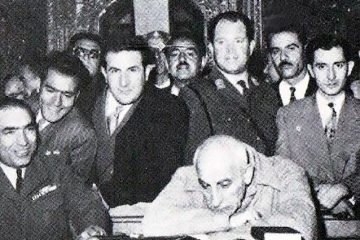The Truth of “How US Came into Existence”
We have often heard the story of the discovery of the Americas by Christopher Columbus and European immigrants in the 16th century, but apparently, the what really happened is something else. and what really makes some point here are distortion, looting, genocide, etc. That is why the recent American protests after the brutal murder of George Floyd (A black citizen whom was killed by the racist Police force of US) demolished and overthrow Columbus’s statue, In protest of racial discrimination.
It is not surprising that these protests and demolishing acts are not reflected in the US medias, and instead, every year, October 12th, is celebrated as “Columbus Day” as the anniversary of Columbus’s arrival in the Americas. no wonder, Because the media is in the hands of those who, by entering America, have always sought to secure their own profits. And still, no wonder, that Americas are known to be discovered, not occupied. It is not strange if one does not know “Columbus’ was a militant and a who suddenly disappeared in his youth and later appeared under the name “Columbus”, with a new identity; and It is not surprising that few know that he was not a Christian from Genoa, Italy, but a Jew from Ponte Vedra, and that his ancestors were Catalans (a region in Spain).Still, it doesn’t seem too confusing, that few would know that, whether Columbus was born in southwestern Italy or of Spanish descent, or even a Portuguese, he was a Jew who sought to discover the Promised Land, along with trading and gaining new resources. So he travelled to America.
The strange thing is that the media; Whose main task is the transmission of facts, has kept these secrets undercover for years. Using tools such as Hollywood and hundreds of thousands of media outlets, the owners of gold and silver have been spreading their monotonic view of the origin of America in the world for decades.
A Country, Born Out of Blood
Who is the Real Christopher Columbus, the legendary father of America? An educated scientist? Or a greedy, lusty beast? Or Christopher; son of the Christ?!
“A good Indian is a dead Indian.” Maybe this sentence from him; represents his true character, one that even thousands of movies and books cannot show.
“From May 1495 to March 1496, Columbus and his brother spent most of their time subduing the island and forcing the Indians to pay taxes,” Charles Verlinden wrote of Columbus’s second voyage: “Each Indian, over the age of fourteen, had to pay a hawk bell full of gold dust every three months. The chief of the tribe must tax a pumpkin full of gold every two months. Those who could not find gold in their area had to pay twenty-five pounds of stranded or woven cotton once every three months. These things were all ugly and awkward. The gold objects that the Spaniards took from the natives were the result of the work and efforts of many generations. Finding new gold, which was large enough to pay taxes, required other generations. And as for cotton, how can one demand a hundred pounds of cotton a year from the savages who are naked themselves? The wages imposed on them – even if we assume they were all paid – made them slaves at the place, and they did not need to be taken to the slave markets for sale.”
“We tried to escape, but they [the soldiers] were shooting at us as if we were Buffalos” said Louise la-Bellette, an American Indian who described how the whites attacked their camp. (۲)
* * *
It’s rightly said that “a liar ought to have a good memory.”
Even Charles Verlinden, who in his writings referred to Columbus as a religious man (۳), wrote elsewhere: “[Columbus] had a short residence in Córdoba. Meanwhile, he met a young lady who was about 15 years younger than himself, named Beatriz Enríquez de Arana. From this woman, a son named Ferdinand was born illegitimately, But Columbus did not marry Ferdinand’s mother because he believed that this marriage would not make him prosperous!” (۴)
“He is a strange man!” Verlinden adds in an obviously contradictory manner of speech. “He is so pious and respectful in his daily behavior, but he has a mistress whom he does not marry for fear of jeopardizing his job!” (۵)
It was as if Allameh Dehkhoda, an Iranian Scholar, knew Columbus better, who considered him a greedy character which “Throughout his journey, he thought of finding gold, and wherever he went, he sought of a trace of it.” (۶)
However, Columbus introduced himself as saying “I want to find the shortest way to Asia. I believe that God has chosen me for such a mission. I have this faith from my childhood enthusiasm to remote areas. I feel. Everything I know about astronomy, geography and the seas is the science he has given me. My mathematical knowledge and my skill in drawing maps are all divine grace; And I have to answer his call, as long as I live.” (۷)
But he was, in fact, seeking political and economic benefits; And political considerations demanded that the religious sentiments of Spain’s Catholic rulers be taken into account.
* * *
Regardless of knowing Columbus’s main motives for his journeys;
It is painful to hear of the sexual evils which Columbus and his companions done to natives; of allotting of the captured Indian girls as portions between the ships, and of Columbus endowing one of the most beautiful girls to his captor, Michel Duconeau (۸).
It is painful to hear the story of 500 Native Americans whom he took with him on his return from his first voyage to Spain, which 200 captives of them died along the way, and the remaining 300 were sold in Spain. (۹)
It is painful to know that when Columbus arrived at the United States, there were 30 million Indians on the continent, and today, less than 2 million are living!
It is painful to read Columbus’s words about the oppressed and defenseless Native Americans: “… They had big and strong bodies, and attractive faces … They do not take up arms and do not even recognize it, because I once showed them a sword, they took it from the cutting edge and wounded themselves out of ignorance. they had no iron, their spears were made of sugarcanes… they are good slaves … only five people were enough to make them obey and do whatever we wanted ” (۱۰)
It is painful to read Attali; A French-Jewish writer, on the kind Native Americans who welcomed Columbus and his companions: “The calm and harmless natives of the island came to greet them [Columbus and his companions], but Columbus did not accept their presence as human beings.” (۱۱)
It is painful to hear of the catastrophes that Columbus and his agents inflicted on the original owners and inhabitants of America; From cutting off the ears of Indians to enslaving people over 13. And so on.
More than anything else, it is painful to watch films in which Christopher Columbus is portrayed as a kind and merciful guy who treats the Native Americans peacefully and amicably, and only some of his companions make mistakes and commit atrocities against the Native Americans.
* * *
But it is time for the “Media”; This efficient tool, to be used to explain the facts of the world and put an end to the domination of the criminals over it.
Yes! It is time for Columbus to be recognized, not as an admiral, nor as a discoverer, nor as a conqueror of the vast lands and restraints of his unrest, but as what he really was.
Tecumseh (of the Shawnee tribe) was right in his diary, saying, “Where is the Pequot tribe today? Where are the Narragansett, Mohican, Pokanoket and many other tribes of our nation that were all strong before? They disappeared under the yoke of whites as snow is melted in by the sun. Will we allow our nation to perish without confronting and resisting? Will we leave our home and our life and our land which the Great Spirit has given to us, as well as the graves of our dead and what is dear and sacred to us? I know that you will shout in unison with me, NEVER! NEVER” (۱۲)
The day will come when all the truths of the world will be revealed, all justice will stand against all oppression, and the justice of all the oppressed will be taken from the oppressors.
Resources:
- Christoff Columbus; Charles Verlanden; P.98
- Brown, D. (1353), The American Nation Tragedy; Bury my heart, Ghazi, Mohammad, Tehran: Kharazmi, P.13
- Christopher Columbus; Charles Verlanden; Pp. 37-36.
- The same; P.36
- The same.
- Dehkhoda Dictionary; The following is the word of Christopher Columbus.
- Christopher Columbus; Armstrong Spray; P 28.
- Christopher Columbus’ adventurous travels; P. 635.
- History of Civilization, vol. 6; P. 321.
- Zayn, Howard (2010), The Untold and Hidden History of America, Tehran, Hilal Publications, P.17
- Sahib Kholq, Nasir (2005), The Untold and Hidden History of America, Tehran, Hilal Publications, P. 32
- Brown, D. (1353), The American Nation Tragedy; Bury my heart, Ghazi, Mohammad, Tehran, Kharazmi Publications, P.23



0 Comments